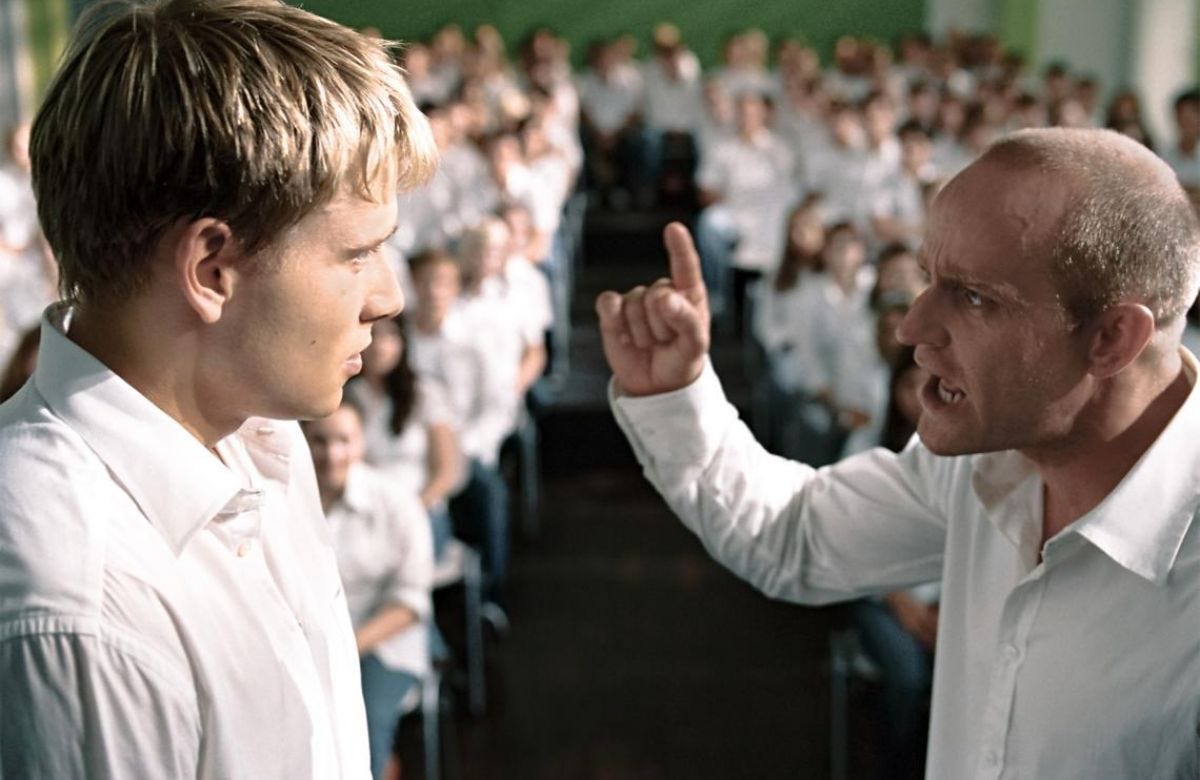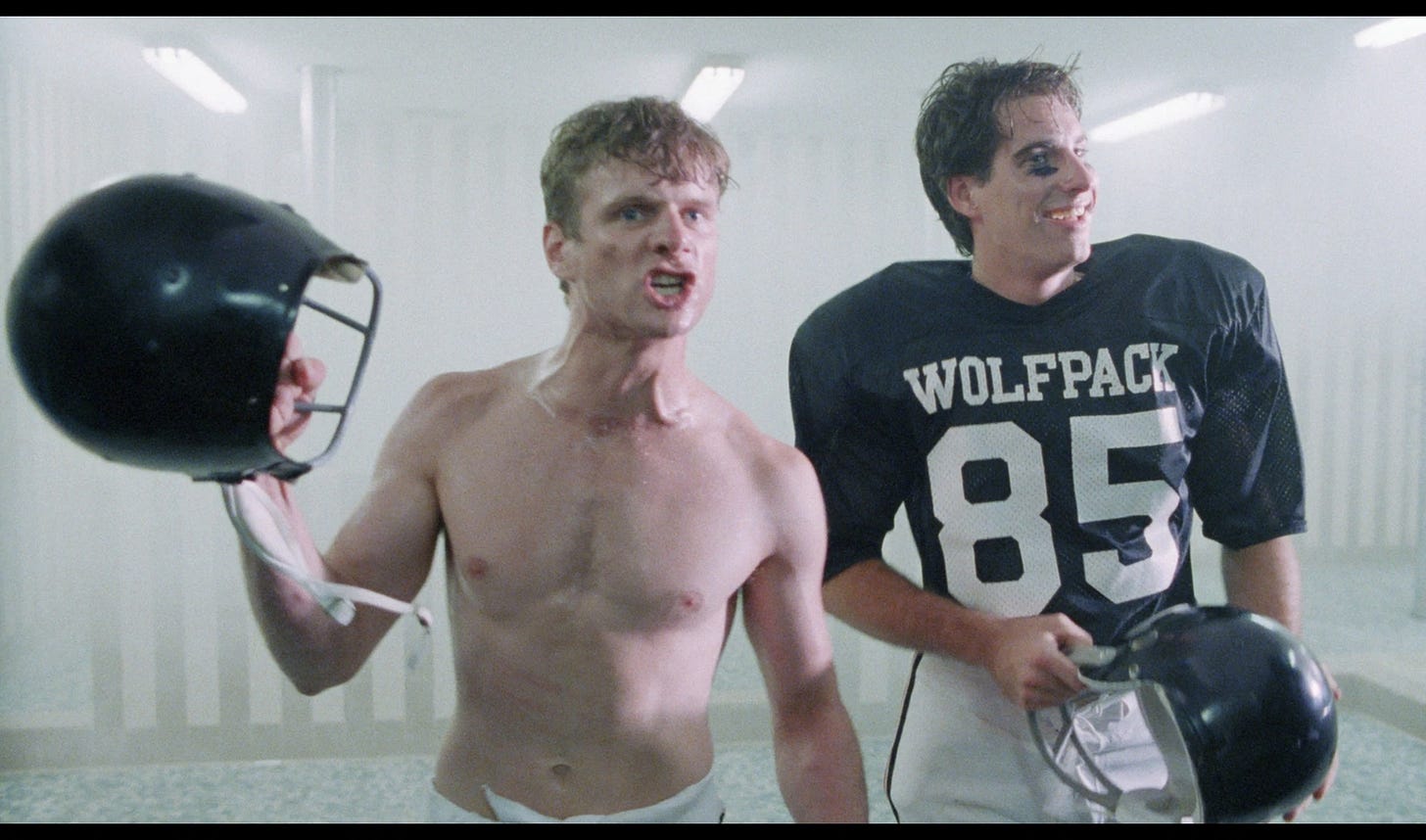Double Feature: The Wave (2008) and Wolfpack (1987)
Back to School Week ends with a frightening fascist double feature.
A teacher just wanted to make sure his students understood the lesson. That's it. That's how it started. That's all that a teacher wants, right? For their students to learn and apply what they've learned and change the world.
Ron Jones, a California high school history teacher, just wanted his class to understand. It was 1967, just a few decades removed from the rise of the Nazis in Germany and it felt like ancient history to this Contemporary World History class. How could the Germans just accept and go along with the Nazis? How does fascism rise so easily?
Instead of explaining it to them, he decided to show them. He instituted "The Third Wave" in his classroom, a Third Reich-adjacent adherence to rules, order, and community that the students found immediate interest in, not at all realizing they were falling prey to the same techniques and propaganda used by Adolf Hitler and other fascist leaders.
That's the experiment depicted in the 2008 German film The Wave (German title: Die Welle). Real life's Mr. Jones becomes The Wave's Herr Wenger (the movie brings it from '60s America to '08 Germany), who decides that his first order of business in this experiment (the same one Mr. Jones enacted to help his students understand German socio-politics) is to make them refer to him no longer as Rainer, his first name and his name when he teaches his Anarchy class, but Herr Wenger, the more respectful name. See where this is going?
His classroom becomes HQ for The Wave (I suppose the term "Third" would make it too obvious to these German descendants. Luckily, Americans are dumb), a group of students led by Wenger who must wear the same clothes, salute each other, work together on all school assignments, and, of course, listen to whatever Wenger says.
I say that they "must" do these things as if most of the students don't immediately love the idea. Having a good student match with a bad student will raise everybody up. Wearing the same white shirt and jeans combo will eliminate class distinction in the class. Having Wenger lead their Autocracy course (I don't know how the students don't catch on...) will be great because he knows more than them.
As the experiment progresses, The Wave gains momentum, and the students' behavior starts to mirror that of a tightly-knit, disciplined group. They even develop a sense of superiority over their peers who are not part of the class. They turn violent - the bullying seems innocent and light-hearted at first, but it's quickly exclusionary and not without a menacing flair. The students who participate (all but one or two students who speak up but are quickly kicked out of the class) are swept up in the desire for belonging and a sense of purpose, even if it means sacrificing critical thinking and independent judgment. The charismatic leadership of Wenger and the allure of being part of something bigger draw the students into a dangerous spiral of authoritarian behavior. They have no idea that they are mirroring the behavior of the very Nazis they couldn't previously understand.
It can only end in violence, when the lesson becomes too real for some students - students who can't let it go when the experiment ends. See how it happens?
The double feature continues with another film mirroring the rise of fascism in a high school classroom.
In 1987's Wolfpack, high school football captain Jack “Boot” Butkowski realizes that people look up to him and thinks he can gain power by using that affability to gain political power. (You may say, "So what? Why would any care who the high school class president is?" Well, in this small town, everybody cares - the stakes are high. Power is power). He's well-read, reading Nietzsche and studying Hitler and Mussolini, and wants nothing more than to rise to the top.
He's off to a good start, he's a quarterback who begins orchestrating an oppressive campaign against those uninterested in sports. Sports are cool, so he's cool. They're strong, so he's strong. They're powerful on the field, and that's what he wants off the field. He runs on an authoritarian platform - cleaning up the hallways, clearing out the druggies - and those who don't comply will face expulsion, or maybe even worse. Teenagers, those who aren't typically down for being told what to do, fall right in line as they see one of their own take power. What would they face if they didn't go along with it?
New kid Sam Adams (neither film is subtle) joins the football team and is immediately suspicious of this entire endeavor. If someone cares so deeply about being the class president, what do they want outside of the walls of this school? And why does everybody care so damn much?
Not just the students, who are quickly falling for this fascist takeover, but the entire small town gets involved. It's not as simple as "they have nothing else to do" - they're getting into it. The entire town has become indoctrinated by the charming young kid who's passionate and well-spoken and "forward-thinking." Little do they know it's just history repeating itself, instead of '30s Germany, it's middle America during Reagan's reign.
While The Wave uses its present day to look back on its country's history with fascism and try to learn from its mistakes, Wolfpack's present day predicts the present day we live in now, one in the wake of a President who retweeted Mussolini - “It is better to live one day as a lion than 100 years as a sheep.”
That 1967 Contemporary World History class could never understand that their classroom would only be the beginning.



